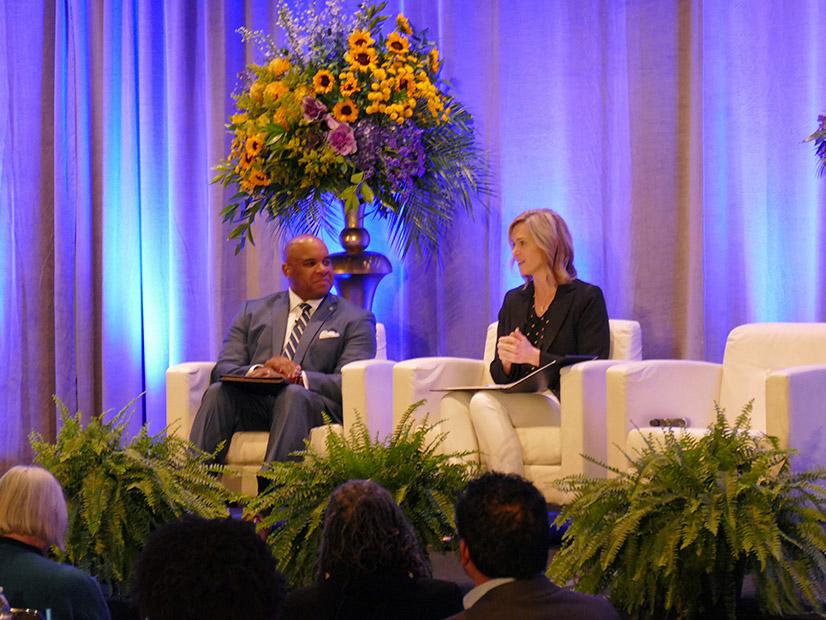
WASHINGTON, D.C. — FERC Chairman Willie Phillips and Sen. Joe Manchin (D-W.Va.) want to pass policies this year that speed up the rollout of transmission, they said at the National Association of Regulatory Utility Commissioners’ (NARUC) Winter Policy Summit on Feb. 27.
FERC already has released Order 2023, which Phillips said he hoped would speed interconnection queues. Taking a project from entering the line to putting shovels in the ground now takes an average of five years.
“We’re looking forward to doing long-term and regional planning as well,” Phillips said. “And we’re going to do it in a way that absolutely works with the state, collaborates with our state regulator colleagues, because you do understand the system better than anybody else.”
When it comes to long-term planning, FERC is not looking to favor one group of state policies over any others, but rather wants to reflect the reality of what is happening on the ground, he added.
“We know the policies across the country change,” Phillips said. “And we know we have more and different resources coming on all the time. It makes no sense to pretend otherwise.”
Another transmission issue Phillips is committed to tackling is interregional transfer capability, which is beneficial in the increasingly common winter reliability events that have affected the grid over the past decade.
“We can say that there are unplanned load sheds, but when something happens every other year, for the past 11 years, it’s difficult to say that it’s unplanned. I think it is stunningly predictable what can happen on the system. So, it’s our responsibility, I believe, to make sure that we have interregional capability to handle this.”
NERC is working on a study on just how much interregional capacity would make sense, and Phillips said once that was complete, FERC would hit the ground running with a proposal to get that built.
Manchin, who is retiring at the end of this year, hopes to get a “permitting reform” bill out of what he said was one of the least productive Congresses in history, having passed just 39 bills through its first year-plus compared to an average of more than 250.
“The politics that we’re dealing with today has been weaponized,” Manchin said. “Whether you’re Democrat or Republican, independent, whatever you might be, God bless you, you’re not the enemy. And the person on the other side is not your enemy.”
While people certainly have opposing views, they should be viewed as opponents who help strengthen arguments and are people you can work with, not enemies who need to be destroyed as many in Washington view them, he added.
Manchin hopes to get an exception to that brand of politics by working with his fellow Energy & Natural Resources Committee leader, Sen. John Barrasso (R-Wyo.), on a bill to get energy infrastructure built quicker.
It’s important to get some significant votes from both parties for their proposal to pass because in recent years, both Republicans and Democrats have made purely partisan pushes on the issue that have gone nowhere, Manchin said.
“This is our last chance, and I am not walking out of here until I give every ounce of effort that I have to get a permitting bill done that gets you from the start to the finish within two to three years,” he added.
Manchin said they’re still working out specifics on how to give states a first pass on dealing with major transmission projects that cross multiple states. He floated the idea of giving states and utilities a year to negotiate on siting and cost allocation before the federal government would step in.
Another issue a bill would tackle is judicial reform, specifically by proposing to limit to six months the time parties have to sue once a project has been approved. They can wait up to six years now, he said.
All these new policies are against the backdrop of an industry expected to see growing demand in the coming years from data centers, new manufacturing, and increasing electrification of transportation and heating. NERC has said demand should grow 38 GW in the next five years, which Phillips said would continue into future decades, as one study has demand growing at an average of 1% per year for the next three decades.
“That means 5,000 terawatt hours of new energy on the system by 2050,” Phillips said. “It’s something that we think about a lot. Increasingly, when I’ve been meeting stakeholders, executives across the country, we’re talking about rapidly increasing demand.”



